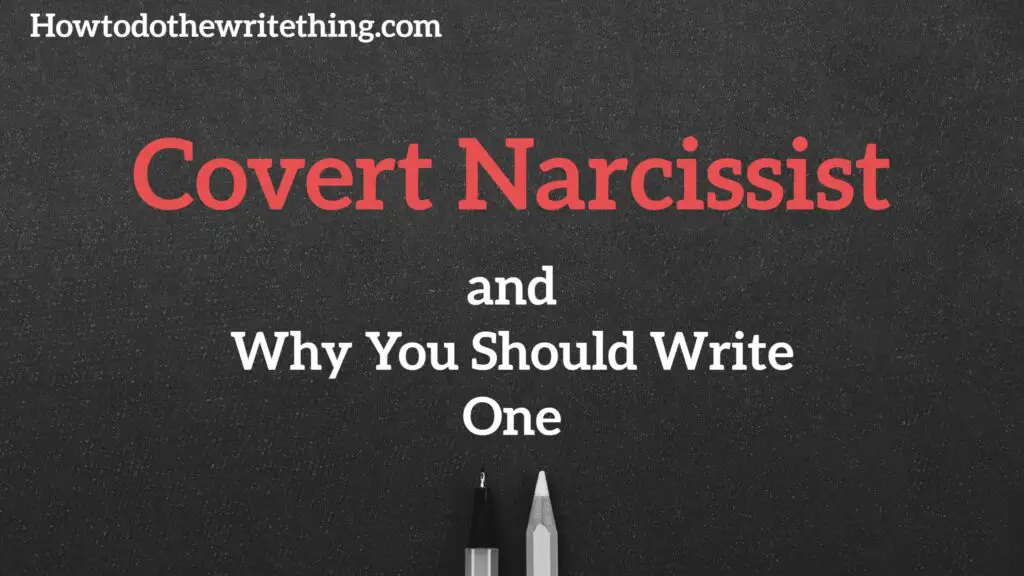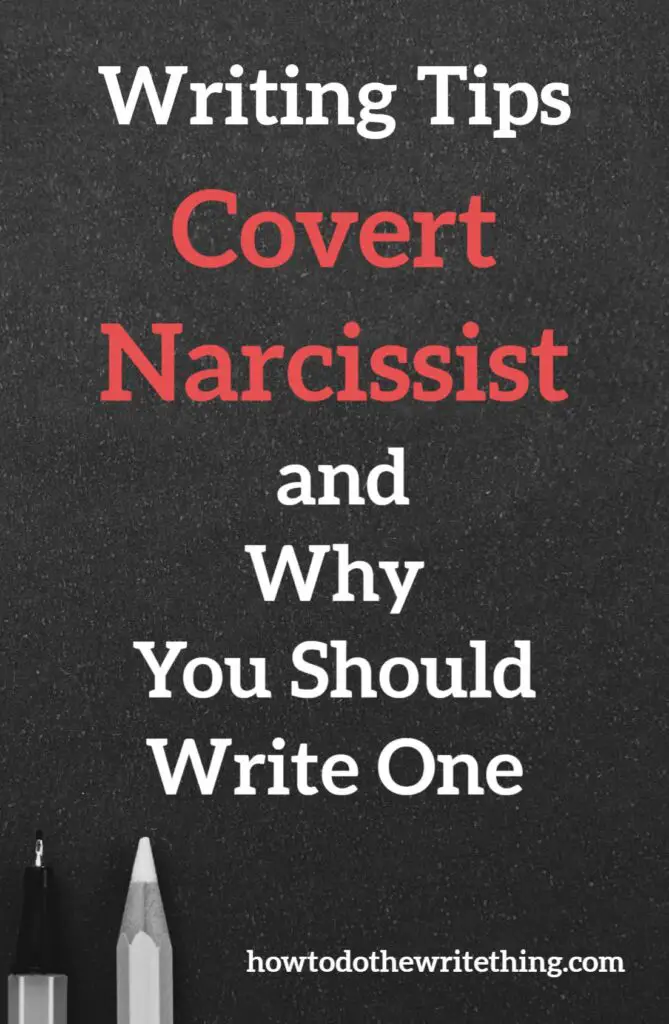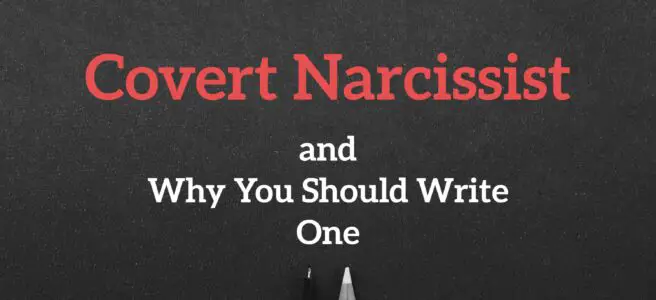
Covert Narcissist and Why You Should Write One
In order to help you write a great covert narcissist, we should first define covert narcissism.
Most people know what a narcissist is and how you can identify one. A lot of people are full of themselves and more concerned about their own wants and desires than that of others, but some people are full-blown narcissists. They are always talking about themselves and their achievements. They will jump on every opportunity to tear others down and say mean things about them.
Their jealousy and malice know no bounds as they see no evil in being narcissistic. They love being the center of attention and are obsessed with looking for ways to be looked at and praised by others.
And let’s clear a myth here, just because someone is an extrovert and enjoys being the life of the party and enjoys being on stage and takes being the center of attention well doesn’t mean they are a narcissist. A narcissist has more signs than just that.
So what is a covert narcissist and why are they harder to identify than a regular narcissist?
Covert Narcissist VS Narcissist
What is a narcissist?
Narcissists are:
- Vane
- Overly self-interested
- Sense of self-entitlement
The English word Narcissist comes from an ancient Greek story about Narcissus.
Narcissus fell in love with his own image and suffered ruin because of it. Is there any truth here? Perhaps, but it seems the story was used to teach against excessive self-love.
According to the 5th edition of the DSM psychologist are now calling obsessive narcissism a disease. (On a personal note I don’t believe this, but I am trying to lay out the current facts to help you write a good fictional character.)
The DSM-5 calls it NPD.
This type of person will be so self-absorbed and so atypical about their sense of self grandeur that they will almost uncontrollably be acting out in certain narcissistic behavior. They may not even be able to see or comprehend that they are doing it. Self-absorbed behaviors will be the main motives of the actions they take and the decisions they make. To characters around them, it might be extremely obvious, but in their own sense of self, they may be completely blind to it and find it normal that all people should act and think the way they do.
NPD has certain symptoms and traits:
What are some traits of Narcissism?
- Extreme lack of empathy toward other characters (including family and friends)
- No sense of remorse when exploiting others even if it hurts them (physically, financially, spiritually, emotionally)
- The belief that everyone owes them something (you owe them for being able to exist next to them)
- Extreme sense of being more special and unique than other characters
- Obsessed with self beauty, power, success, well-being, preservation
- Constantly desires admiration and craves acknowledgment for endeavors
- Does not understand why others don’t see their special nature and can feel offended to an extreme degree if not admired
- May over embellish their own success and accomplishments
- May zone out often fantasizing about fame, influence, and potential
What are the symptoms of NPD?
- Hard time forming normal relationships
- Fictional view of self-importance over the importance of others
- Hard time with empathy
- The continual need for admiration from others without giving any genuine praise in return
Let’s clear up an obvious question. Is liking yourself and being comfortable in your own skin narcissism? No.
Someone can like themself and be comfortable with who they are without being overly self-loving. To be narcissistic would mean that a person would see themself as more important than others. Being completely self-indulgent.
They are not concerned if their actions hurt others as long as they get what they want, it is just a means to an end.
Does this mean that their self esteem is high?
No, not necessarily. An obsession with self can lead to low self-esteem if others do not constantly affirm their overly inflated view of self-worth.
What is an overt narcissist?
An overt narcissist is the opposite of a covert narcissist which can be described as someone whose obsession with self is seen outwardly and as an extrovert at being the center of attention at all times and sees anyone that gets more attention than them as enemies of their true purpose in life.
A stereotypical overt narcissist may be considered loud, obnoxious, and rude, but still craves unusual amounts of admiration. They will completely ignore naysayers and easily find followers in the crowd that will listen to their noise and praise them without question or rebuttal.
What is Covert Narcissism?
Covert narcissism is also known as vulnerable narcissism. It means the person has an obsessive need for admiration from others but suffers from a lack of empathy towards others. But a covert narcissist is harder to identify based on outward actions. Their key traits are subdued, understated, and are less evident or apparent.
The covert narcissist still lacks empathy and craves praise and approval at an extreme level. They lack the ability to control their own view of self-esteem.
This is why I say you should consider adding one to your story. Characters that are a certain way but are hard to identify easily make for interesting almost mysterious characters that need more time and problem-solving to figure out who they are and what their deal is.
A covert narcissist may come across as shy or introverted. They may exhibit self-depreciation behavior, but their end goal is the same as an overt narcissist. They want to be glorified. They may seek to make people feel bad for them to get attention and love. They may lie to get what they want.
They also may have a victim mentality.
The covert narcissist may say negative things about themself or constantly feel that they are “unlucky.” Their life is irregularly harder than anyone else’s. They alone have the worst circumstances to deal with.
It would not matter the amount of wealth or luxury they have in life. They still would find ways to be discontent with their circumstances.
Even though they think little of their circumstance, they still view themselves as the center of the universe. It is just that they feel the universe doesn’t realize their importance as they do.
Overt VS Covert Narcissist
Overts are easy to see from a mile away whereas the covert narcissists are harder to see coming. A covert narcissist is easier to be manipulated by and hurt before the character realizes what has occurred. Characters interacting with them that are unaware might become victims of abuse quickly and then are disregarded by the narcissist as soon as they are deemed ‘unuseful.’
In some cases, characters can be manipulated for long periods of time before they realize it. They could be married. It could be their ‘best’ friend. As long as the character has been useful or delightful to the covert narcissist then they are kept around, but as soon as they become ‘too much work’ or ‘undesirable’ they will likely be discarded even if the relationship has lasted many years.
Whether children are involved in the marriage or not is not important to the narcissist as they lack the ability to experience empathy as long as they are lost in their extreme self-love. Hurting others is not a thing they even consider. They are wholly concerned with what is best for them.
Let’s talk about signs of a covert narcissist:
They may be depressed
A covert narcissist is more likely to experience self-inflicted anxiety and depression about whatever they deem to be unfair about people not seeing them as important as they see themselves.
They have difficulty with keep relationships
They find it impossible to see that anyone could be as important as they are. This strains their relationships. They may be able to put forth extreme effort to gain a partner in a relationship, but with time the partner will most likely lose interest as they will discover the narcissistic behavior of the other.
Difficulty in work relationships
Very similar to romantic relationships they will have trouble building meaningful relationships with co-workers.
They will easily make fun of or dismiss their coworkers as inferior even if they are better workers. They will find excuses to believe that no one is better than them and thus they will inevitably push others away all while wanting them to like and adore them the way they adore themselves in their minds.
Extremely sensitive to criticism
Do not try to tell the covert narcissist that they aren’t doing it correctly. This will only lead to dangerous waters. A covert narcissist may not directly tell you that you have slighted them, but they may plot revenge none-the-less.
And that is the scary part about it. An extraverted narcissist might scream in your face and threaten you on the spot, but if you back down immediately they may feel justified and superior and leave you alone. Not so with the covert narcissist.
They will go away scheming your demise. Their vengeance will be felt.
Avoids social gatherings
Large social gatherings may be difficult for the covert narcissist. They may be too overwhelmed with what people think of them to function properly and thus be even more self-obsessed and upset about how their social interactions are failing.
In their minds, it’s better to know they are better than everyone else and not give anyone a chance to prove them wrong. “Who needs other people anyway!” They might think.
This can manifest itself in some sort of social anxiety.
A hushed sense of superiority
The covert narcissist may appear to be meek and humble, but in reality, they try to avoid situations that could make them look bad.
They may not be the strongest person in the room, but that is because “wasting time on strength training is for inferior beings. True strength is in the mind.”
In other words, they will make excuses for their weaknesses as if it doesn’t matter. They are no less in their own minds, they just build up excuses to justify why they are “not worried or concerned” about those areas of life.
Covert Narcissist and Why You Should Write One
Enjoying Covert Narcissist and Why You Should Write One? Take a moment and consider sharing this social-friendly image to say thanks and feel free to comment with your thoughts below! 🙂

A brief intermission from: Covert Narcissist and Why You Should Write One for our affiliate programs.
These programs help us stay supported and give you free-content to enjoy 🙂
Need a Cheaper Plan? Try DreamHost.
If you enjoy Covert Narcissist and Why You Should Write One, storytelling, and writing in general, you might love owning a domain of your own where you can write about it? Ever want to own your own domain name (Yourname.com)?
Bluehost hosts your blog so that you can own your domain and make money blogging. Check them out only if you’re interested in making money blogging; otherwise, go for a free blog instead 🙂
Try Grammarly, The Free tool that should be in every writer’s toolbelt.
Covert Narcissist and Why You Should Write One
Check this out.
Onward to: Covert Narcissist and Why You Should Write One 🙂
They will blame others for their mistakes
Nothing is ever their fault. They may even lack the capacity to learn from mistakes because in their mind they don’t make mistakes. They will find any way to make sure that in their own minds and in others they are never seen as wrong.
They will shame others for personal gain
Shaming others is not an uncommon tactic for a covert narcissist to get other characters to treat them the way they desire to be treated.
They will often use shaming to make others feel like they owe them something. They use it to have a sense of superiority and to maintain their goal of making every character feel like they owe them something.
Even if they know they are wrong they may pretend to be emotionally hurt to get you to feel bad and thus in their mind the tables have turned in their favor.
Make the other character feel stupid or less intelligent
By making another character think that they are not as smart they can manipulate them more easily. A good example of this type of character interaction is the ape and the donkey in C.S. Lewis The Last Battle.
If the covert narcissist can get you to question yourself and your thoughts even if they know that they are wrong and you are right they win the upper hand against you and then they can get you to serve them once again.
Purposeful neglect and procrastination
The covert narcissist can be crafty at getting what they want. They will use manipulative techniques like neglect. They may purposefully get a person addicted to them and then neglect them to get more and more attention from them. Almost like playing ‘hard to get.’
They will also purposefully procrastinate doing things for the other character to keep them constantly on a leash waiting. Every once in a while they may throw them a bone, but it is only to keep them coming back for more.
Giving to get
They will use gifts and bribes to receive things in return. They don’t normally give out of the goodness of their heart or just out of a feeling of appreciation or love. They keep tabs on people they give to and everything they give.
They give with the idea of receiving. They give with the expectation of ‘you owe me now.’ And if the character does ‘pay up’ then they feel slighted and they might seek revenge.
They may even want other characters to view them as generous, but they are not.
Psychologists’ thoughts on causes
Some experts in the field of psychology hypothesize that these types of feelings and behaviors could be the result of poor parenting. It is thought that parents that make too much of their child’s achievements lead them to believe that they were indeed more special than any of their peers.
The thought then alludes to the fact that if a parent has a warmer approach towards love and affection for the child then the child learns a healthier way to love others too.
(Personally, I don’t believe this since I’ve seen 3 years olds lie out of fear of being caught. No one taught them to think selfishly. They innately chose it of free will in the quick of the moment. But that is neither here nor there.)
But you can use such information as good reasoning for a back story.
“People with covert narcissism may have a parent who displays similar traits, abused them as children or both. Psychologists do not yet understand why some people develop covert NPD rather than overt NPD.”
How will others respond to a covert narcissist?
Well, it depends.
It will be challenging for others. Their patience will be tested and tried.
Let’s talk about friends and family:
It will be hard for family to enjoy being around this person for extended periods of time. They may appear to be clingy to those that are kind to them.
The introverted narcissist will love the attention and praise the kind person gives them and will come back for more as if it were candy, but instead of giving praise back, they will most likely find ways to make fun of them and point out their flaws as this behavior ultimately makes the covert narcissist feel good about themselves.
If the family member or friend confronts them on their mean behavior they will be offended and think that the friend is treating them badly. This will most likely end with them stomping out of the room quickly as they will not stand for such treatment from a “lower being.”
For people that handle interactions with the narcissist well, it will be in small controlled doses more than likely. For those that do not do well with them, they will most likely avoid them at all costs.
This leaves two scenarios for people to carry out in reaction to the covert narcissist’s behavior. They will either avoid them with haste entirely or be kind to them and chat for a bit but then quickly dismiss themselves.
If the person is truly kind then that will be the end of it, but if they too are just trying to ‘make face’ then they will most likely say hurtful things about the person with NPD behind their back.
This can make for very interesting character dynamics and interactions.
Those who interact with the narcissist may choose to limit the amount of personal information they share with them. This might be in their best interest. The narcissist may use ‘sensitive’ information about them to gain favor and superiority in the eyes of others. Being able to put them down may make the covert narcissist look better to their peers so they think.
There can also be traumatic altercations.
If anyone, friend, or a family member has been abused by the covert narcissist they may choose to stop seeing the person altogether. They may even draw up lawsuits or legal restriction orders that keep them from seeing the person ever.
Consider these types of situations if writing a covert narcissist.
For example,
Let’s say your main character is a brilliant detective, lacks empathy, but always solves the case (thank you, Sherlock). But as we watch our character’s days go by we start to see instances of “friends” and a family from their past. But wait, they can’t see their kids anymore. Why? Because the spouse got a restriction order after they decided to retaliate against a comment the kid made about their funny smell. They like cigarettes but still took the comment personally from the naive adolescent.
So now we have a dynamic character that has a complicated family history that alienates them from those they most likely wish they could be close too. That makes for great potential drama.
Things that you could accuse your typical covert narcissist of:
- Financial betrayal between partners or spouses
- Verbal abuse
- Sexual abuse
- Psychological abuse (purposefully, methodically, and secretly looking to tear down their mentality)
- Physical abuse
- Emotional abuse (trying to get them to feel guilt over things that aren’t true, knowing they aren’t true)
- Domestic violence
When writing your covert narcissist keep these typical problems in mind. Use them to write interesting conflicts between characters that will keep your reader interested in the characters and how they develop.
Why should you write a covert narcissist
A covert narcissist’s traits, signs, and behaviors give a lot of material for complicated character relationships and complex character problems.
Covert narcissists don’t have to only be the antagonist. The protagonist can be covertly narcissistic.
This character may have a hard time making and keeping relationships, but the fact that they wrestle with their inner demons of extreme self-love can be very interesting for a reader.
Consider writing about a covert narcissist the next time you are starting a writing prompt.
Feel free to use this resource to give you ideas and inspiration on how to make them come to life on your pages.
Hope this helps!
Happy writing!
Other Popular Posts you might enjoy:
5 Tricks How to Hide Your Villain Right Before Their Eyes
10 Tips How to Write Villains that Play Mind Games with Their Victims
4 Tips How to Write your Character Hitting Rock Bottom
10 Toxic Bad Habits That’ll Crush Your Fictional Character’s Relationships
How to Write From Your Villain’s Mind.
How To Write 4 Scenes That Reveal Who Your Character Is Seamlessly
Psychopath: How to Write The Perfect Psychopath
8 Tips How to Write the Perfect Sociopath
Fictional Characters: 28+ Bad Habits to Introduce to Your Fictional Characters
List of 10 Weapons for Fictional Characters
List of 10 Bad Habits Fictional Characters Need Help Breaking
Covert Narcissist and Why You Should Write One
Resources:
How to Start a Blog in 11 Simple Easy Steps in 2020
Need a Cheaper Plan? Try DreamHost.
If you enjoy Covert Narcissist and Why You Should Write One, storytelling, and writing in general, you might love owning a domain of your own where you can write about it? Ever want to own your own domain name (Yourname.com)?
Bluehost hosts your blog so that you can own your domain and make money blogging. Check them out only if you’re interested in making money blogging; otherwise, go for a free blog instead 🙂
Try Grammarly, The Free tool that should be in every writer’s toolbelt.
Covert Narcissist and Why You Should Write One
Check this out.
Covert Narcissist and Why You Should Write One
Enjoying Covert Narcissist and Why You Should Write One? Take a moment and consider sharing this social-friendly image to say thanks and feel free to comment with your thoughts below! 🙂



Covert Narcissist and Why You Should Write One
Need a Cheaper Plan? Try DreamHost.
If you enjoy Covert Narcissist and Why You Should Write One, storytelling, and writing in general, you might love owning a domain of your own where you can write about it? Ever want to own your own domain name (Yourname.com)?
Bluehost hosts your blog so that you can own your domain and make money blogging. Check them out only if you’re interested in making money blogging; otherwise, go for a free blog instead 🙂
Try Grammarly, The Free tool that should be in every writer’s toolbelt.
Covert Narcissist and Why You Should Write One
Check this out.
Make sure your posts are readable. Use this readability score check
Want to check out a writer’s community to test your writing and get feedback?
Check out these FREE trial resources from Amazon for when you work from home (or are stuck at home 🙂 )
Free Prime Membership Trial:
Try Amazon Prime 30-Day Free Trial
Try Prime Discounted (Free Trial)
Make your Free Amazon Wedding Registry:
Create an Amazon Wedding Registry
Get Free Video Channels Trial with Prime:
Join Prime Video Channels Free Trial
Try Free Amazon Family Trial:
Join Amazon Family (30-day Free Trial)
Get Unlimited Music for Free (30-day free trial):
Free movies and TV shows trial:
Join Amazon Prime – Watch Thousands of Movies & TV Shows Anytime – Start Free Trial Now
Free Prime for students trial:
Free Baby Registry:
Shop Amazon – Create an Amazon Baby Registry
Free trial of Twitch Prime:
And for when you REALLY work at home:
Create Amazon Business Account
It is the Amazon you love, for work. Make workplace procurement easier with convenient delivery options, simplified purchasing workflows, multiple payment options, and a competitive marketplace with business-only pricing and quantity discounts. Anyone who makes purchases for work (eg. procurement specialists, office administration, IT departments, etc.) can create a FREE account for their business. Customer must be from a verified business in order to successfully create their Amazon Business account.
We hope you enjoyed: Covert Narcissist and Why You Should Write One!




